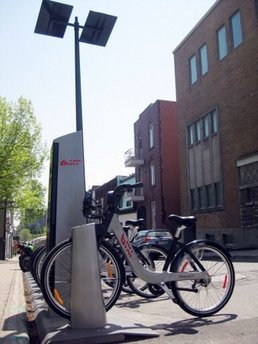Montreal, bicycling and the world class city
Charles Landry makes a point in his presentations and his latest book, The Art of City Making, that to be world class isn't only what the city does for itself, but how the city in turn contributes to the world.
Montreal's Bixi bicycling sharing system is a fascinating example of this, showing that the public sector can be transformative and innovative in ways that challenge convention. Also see the articles "Public sector innovation" from the Ottawa Citizen. and "Montreal Exports Its Bike-Sharing Program" from the New York Times.

Montreal launched 3,000 bicycles called " Bixi", available from May to November with the help of a subscription rate of 78 dollars a year, $28 for one month or $5 for the day. A combination of bicycle and taxi, the BIXI program offers 3,000 bikes for Montrealers to ride around the downtown core, from as far west as the Atwater metro station to as far east as the Prefontaine station. (AFP/Clement Sabourin)
For example, one of the biggest problems with the "traditional" bicycle sharing systems and their stations is that they require electricity. This is a problem not only in dealing with recalcitrant local utility companies (at least Pepco in DC is problematic, maybe this isn't the case in cities like Paris), but in finding locations where electricity connections can be made, and then in having to construct and make the connections. All in all this adds time and significant cost to the process.
The city's parking authority, Stationnement de Montréal, decided to create their own system rather than have to pay others for one. Typically bicycle sharing systems are developed through a kind of "ransom" as a city sells the privilege of placing advertising in public spaces in return for various benefits from the contractor, including outfitting a bicycle sharing system.
This creates a negative dynamic between the operator and the municipality, because the municipality wants to expand the system, while the operator wants to minimize costs to maximize profitability.
BIXI, the project of the parking authority in Montreal, has just won the contracts to provide bicycle sharing systems to Boston (see "Vendor selected for Boston area bike-sharing program " from the Boston Globe) and London (see "Serco wins race to run London hire bikes" from the Times of London).
Impressive.
Labels: bicycling, change-innovation-transformation, design method, transportation planning, urban design/placemaking, world class cities



0 Comments:
Post a Comment
<< Home